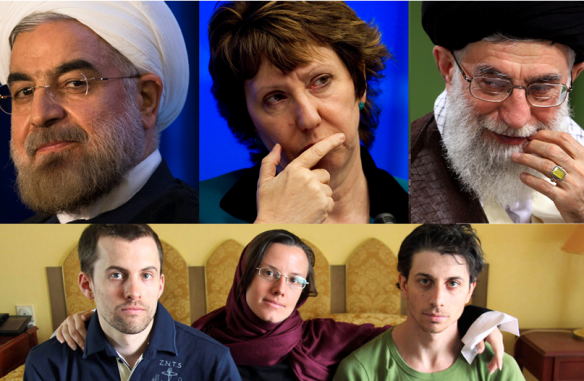For those who don’t know who Nazanin Ratcliffe is, here’s a summary: Nazanin is a British-Iranian mother who was arrested on April 3ed at the airport in Tehran, with her 2 year-old daughter, following a visit to her family in Iran. At first she was charged with spying but then the regime clamped down on any information regarding her case. After 150 days in jail, during which she had limited contact with her family and her lawyer, she was convicted to 6 years in jail in a closed-door court for “secret” charges. Obviously, no evidence regarding Nazanin’s “crimes” was shared with the world and she continues to maintain her innocence. But then again, Nazanin’s case only exemplifies the fact that in cases in which the regime is intent on arresting or executing someone, the ideal of “innocent until proven guilty” is traded for “guilty until proven innocent” mixed with severe restriction on a proper legal defense. Her daughter is living with Nazanin’s parents and is not allowed to leave Iran while her husband has remained in the UK out of fear that he too would be arrested. Nazanin’s physical and mental health is deteriorating and word has leaked out that she has become suicidal.
Nazanin is not alone: 6 other dual-nationals from the West (Canada, US and the UK) were arrested under similar circumstances. Dual-nationality is not recognized in Iran and the unfortunate dual-nationals who were arrested were stripped of their foreign passports, losing their rights to involve the help of foreign embassies in Tehran Furthermore, it’s important to remember that following the signing of the JCPoA, 4 dual nationals were freed from jail in what some claim was one of the biggest case of ransom since the US flew out $400 million to Iran just before the prisoners were freed – President Barack Obama claimed that the money had nothing to do with ransoming the prisoners and everything to with the initial implementations of the nuclear deal but no one really knows.
The arrests of dual and foreign nationals is not something that President Hassan Rouhani would really want in view of his repeated invitation for foreign investments in Iran but then again, that’s probably why these people are in jail: Rouhani’s opponents, hardliners within the regime including the IRGC which is responsible for all of the arrests of dual/foreign nationals, are probably using these arrests to weaken Rouhani to the world. These are the same forces which have actually increased the number of executions under Rouhani, knowing that he is powerless to block these travesties of justice. One thing is certain, the hardline elements in Tehran have no qualms of imprisoning or executing people in order to weaken Rouhani.
The issue of ransoming dual-nationals imprisoned in Iran has come again in regards to Nazanin. Word is spreading that Nazanin is being held as a bargaining chip for a debt of 500 million pounds which the UK owes to Iran. The UK foreign office has denied these allegation and maintains that it is doing all it can to help free Nazanin but there is no evidence that such efforts are a reality – the foreign office might be pressuring Tehran behind the scenes as part of its renewed diplomatic relations with Iran but any such efforts, if they exist, are hidden from public scrutiny.
Whether or not Nazanin is being held for ransom, or simply as added pressure on the UK or because Tehran really believes that Nazanin is guilty of some crime which justifies being sent to jail for six years is not clear. But the ransom alternative makes a lot of sense: Tehran needs money, as cash payments or through foreign investments. The UK, on the other hand also wants money by either selling its goods to the Iranian market or through investing in Iran. So, both sides stand to gain financially from good relations. The outstanding 500 million pound debt is bound to be an issue between Tehran and London which will have to be finalized at some point in the near future. Demanding that normalized diplomatic relations should carry a price tag, 500 million pounds, can be “sweetened” by freeing Nazanin. Just as Obama denied paying ransom for hostages, so will the UK government. But at the end of the day, if money exchanges hands and prisoners are freed, the definition of ransom fits the bill.
In the meantime, Nazanin remains in jail, separated from her family while her family in in Iran and in the UK helplessly look on as human rights organizations continue to pressure Tehran without success. Whether Nazanin really is a spy or not is irrelevant to the regime since she is a perfect bargaining chip to make money and a perfect pressure point to weaken Rouhani.




